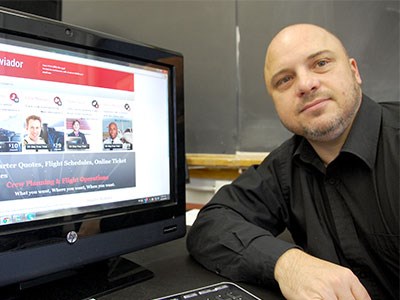A Thunder Bay entrepreneur has invented an aviation management and tracking software that he hopes will take off in 2013.
Paul Gibson, founder of Flightop.com, has a mobile airline ticket solution that's starting to gain traction with international startup air carriers.
His flagship product, Aviador (Spanish for aviator), offers a very popular ticket agent module that subscribers can sign up for to manage online sales.
When Gibson first offered the product on Google last August, the web queries were fast and furious.
“We had six guys straight away, but startup airlines are fickle beasts-many don't pan out. A couple went under so we're down to four.”
His focus is on carriers in northern Canada, Alaska, South America and Africa; “these remote places where there's low infrastructure. The airports tend to be small and how do you check somebody in when there's no internet?”
Gibson's three-employee company makes money by charging a dollar for every ticket sold.
He hopes the popular ticket agent module is a selling piece for his other offerings and added features in passenger and crew management, cargo, and a flight planning tool.
“I don't think we'll expand beyond this. Selling maintenance is a tough job because it's not a revenue generator and doesn't increase sales.”
After graduating from Confederation College, the Yorkshire, U.K. native was introduced to aviation-related software during a placement at Thunder Bay International Airport.
He later worked as a programmer and tech lead for various local web development shops before quitting to set up his own business.
The idea for Aviador was spawned from a passenger management solution he had built for NAC Air in 2003.
“I still had the code kicking around, so I thought, let's see what I can do with this.”
Gibson ran it by a former colleague, Paul Smyk, now working as a Wasaya Airways pilot.
“He said, go to Google and get it ranked up the top two or three hits, and see if we can actually sell this as a service with a monthly fee offering access to the software rather than sell it for a licence.”
Gibson views it as a cost-effective and efficient solution for small charter airlines selling 15 tickets a week, instead of going to the expense of buying a server or hiring an IT systems administrator.
An iPad-friendly version is now under development for passenger manifests – replacing paper print-outs – to allow pilots to do weight calculations, a “constant battle” for air carriers in the North.
“One of our key partners is Wasaya Airways and we're working with their cargo guys now trying to integrate their weight calculations.
“We want to integrate passenger movements with cargo to help with the decision support. If there's enough cargo that's backed up, they can put it on extra aircraft that's pure cargo.”
Gibson said his company will grow as his clients grow.
On the ticket agent side, a Florida client, Choice Airways, has signed on and a Zambian charter carrier, Royal Airlines, is coming onstream in January.
“We're getting the interest and the clients, but it's not translating into revenue fast enough. But they're startups themselves. They're not making any money either.
“Because we're based on a per ticket (charge) as our main revenue generator, until they start selling tickets, we're not making anything.”
Gibson moved the home-based business into the Northwestern Ontario Innovation Centre in September.
“I'm a technical guy. I had an idea but I didn't know the nuts and bolts on the business side of how to make this work.”
Innovation Centre staff helped with his business and marketing plan, secured support through the Industrial Research Assistance Program and gave him the feedback to stay on track. “It was good to have that encouragement.
“I had this romantic idea of leaving my job, how it was going to be great and the freedom, but when you're sitting in your basement and it gets to be 5 p.m. and you walk upstairs, you start going crazy after a while.”
Despite the ups and downs with clients
and leads that didn't pan out, Gibson said they've stayed true to
their business
plan with three solid clients in the fold after
four months.
“Our target is to get to five paying clients and that will get us self-sufficient.”
While Aviador has attracted plenty of interest online, Gibson said hitting the industry trade shows is a must.
“If we could get to the right venue,
and we've got a really good story, we can do a
lot of sales if
people can see what it has to offer.”




